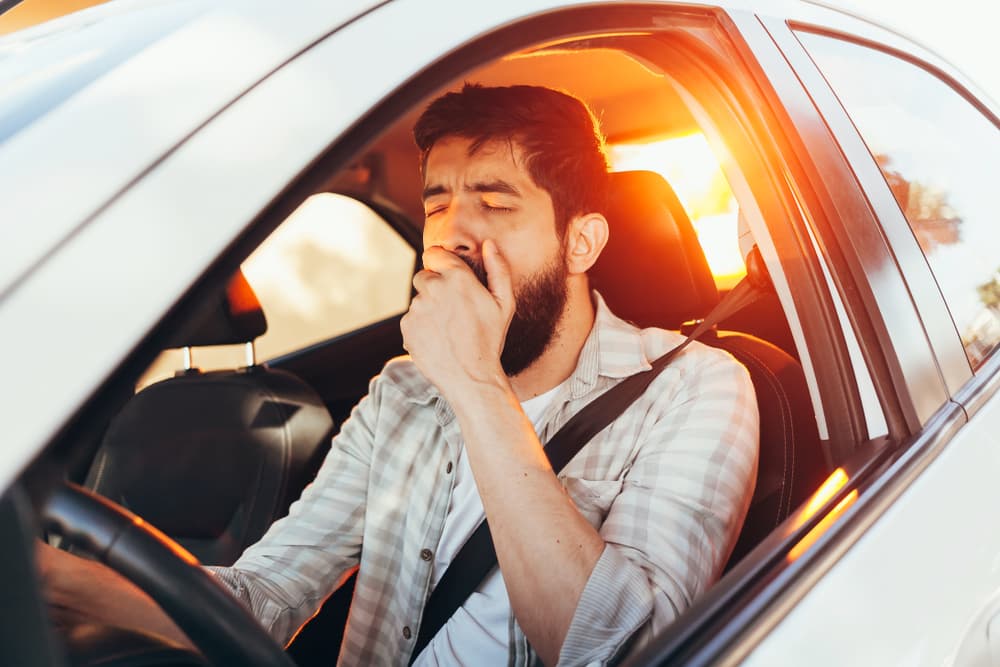What Effects Does Fatigue Have on Your Driving: Everything You Need To Know
After a car accident, it's not uncommon to ask, "What effect does fatigue have on your driving?" At Blakeley Law Firm, we understand the devastating consequences of fatigue-related accidents. Our car accident attorneys are dedicated to raising awareness of this issue and helping those impacted by it.
Reach Out Today!
Understanding What Effect Does Fatigue Have On Your Driving

To truly understand what effect does fatigue have on your driving, it’s essential to first know what fatigue is.
Fatigue isn’t just feeling tired; it’s a state of mental, physical, or combined exhaustion that disrupts both cognitive and physical functioning. It can result from inadequate sleep, long periods of intense mental or physical activity, or a mix of both.
Unlike simple tiredness, fatigue can greatly diminish your ability to drive safely, making it a critical issue for every motorist.
How Common is Driver Fatigue?
While pinpointing the exact number of fatigue-related crashes is difficult due to the complex nature of identifying the cause, available statistics paint a concerning picture:
Prevalence
- AAA Foundation for Traffic Safety: Estimates 328,000 drowsy driving crashes occur annually in the US, more than three times the 109,000 police-reported crashes last year. This suggests many fatigue-related accidents go unreported.
- Centers for Disease Control and Prevention (CDC): An estimated 1 in 25 adult drivers (18+) reported falling asleep while driving in the past 30 days, highlighting the prevalence of drowsiness behind the wheel.
Fatalities
- National Highway Traffic Safety Administration (NHTSA): Drowsy driving was involved in 91,000 crashes in a recent year, resulting in roughly 50,000 injuries and nearly 800 deaths. However, they acknowledge this is likely an underestimate, with estimates suggesting over 6,000 fatal crashes annually may involve fatigued drivers.
- AAA Foundation for Traffic Safety: Estimates that 16% to 21% of all police-reported fatal vehicle crashes likely involve drowsy driving.
Additional Considerations
- Underreporting: Difficulty in definitively determining fatigue as the sole cause of accidents contributes to underreporting.
- Time of Day: Drowsy driving crashes are most frequent between midnight and 6 a.m. and in the late afternoon due to natural dips in alertness.
- Demographics: Individuals with sleep disorders, shift workers, and young drivers are at increased risk of driving fatigued.
The Impact of Fatigue on Driving
Fatigue affects various aspects of a person’s cognitive and physical abilities, significantly impairing their driving performance. Here's how:
Slower Reaction Time:
When someone is fatigued, their brain takes longer to process information and react to situations. This can be crucial on the road, where split-second decisions can mean the difference between avoiding an accident or causing one. Studies show that reaction times can be as slow as those under the influence of alcohol.
Impaired Judgment and Decision-Making:
Fatigue can cloud a person’s judgment and make it difficult for them to make sound decisions behind the wheel. They may misjudge distances and speeds, take unnecessary risks, or fail to react appropriately to unexpected situations.
Reduced Vigilance and Attention:
Fatigue can lead to drowsiness and difficulty staying focused on the road. Some may find themselves daydreaming, losing track of time, or missing important visual cues like traffic signals or pedestrians.
Microsleep:
In extreme cases of fatigue, someone may experience microsleep, which is an involuntary lapse in consciousness lasting mere seconds. These microsleeps can be incredibly dangerous, as they can cause someone to completely miss critical events on the road.
Emotional and Behavioral Changes:
Fatigue can also lead to changes in mood and behavior that affect driving. Tired drivers may exhibit increased irritability, aggression, or recklessness, contributing to dangerous driving practices. These emotional and behavioral changes can exacerbate the risks associated with driving while fatigued.
Warning Signs of Driver Fatigue
While directly assessing another driver's fatigue level is difficult, you can be alert to certain behaviors that may indicate someone is driving while fatigued. Here are some warning signs to watch out for:
Driving Behavior
- Swerving or weaving: This can indicate difficulty maintaining lane position due to drowsiness.
- Straddling the center line or lane drifting: Pay attention if the driver repeatedly drifts towards the edge of the lane or crosses the center line without signaling.
- Slow and erratic braking: This could be a sign of slowed reaction time or struggling to maintain consistent speed.
- Following too closely: Fatigued drivers may maintain an unsafe distance due to decreased awareness of their surroundings.
- Slow reaction times: Look for delayed responses to traffic signals, pedestrians, or other vehicles.
- Headlights off at night: This can be an indicator of inattention or drowsiness, especially on longer journeys.
Physical Signs
- Frequent yawning: Excessive yawning, especially paired with rubbing eyes or struggling to keep them open, can be a strong sign of fatigue.
- Head nodding or slumped posture: This suggests the driver is struggling to stay awake and alert.
- Difficulty steering or keeping the vehicle straight: If the driver seems to have trouble controlling the vehicle, it could be due to fatigue.
Where Do Most Car Crashes from Fatigued Driving Happen?
Fatigued driving, a prevalent and dangerous issue, occurs across various settings and conditions, impacting drivers worldwide.
It is not confined to any single geographical location or type of road; instead, it can happen anywhere, from bustling city streets to remote rural areas. However, certain patterns and contexts are more commonly associated with fatigued driving incidents:
Long Highways and Monotonous Routes

Fatigued driving incidents are frequently reported on long, monotonous stretches of highway where the repetitive scenery and lack of active driving tasks (like turning or stopping) can lead to decreased alertness and boredom, making drivers more susceptible to fatigue.
Rural Roads
Rural areas, with their less busy roads and sometimes limited lighting at night, can also be common sites for fatigued driving accidents. The quiet and less stimulating environment, combined with potentially long distances between destinations, contribute to driver fatigue.
Overnight Driving
Driving during nighttime, especially between the hours of midnight and 6 a.m., poses a high risk for fatigued driving. This period aligns with the body's natural circadian rhythm of sleepiness, increasing the likelihood of drivers feeling drowsy or falling asleep at the wheel.
After Long Work Shifts
Individuals coming off long work hours or shifts, particularly those involving manual labor or high levels of stress, are at risk of fatigued driving as they may be physically and mentally exhausted.
Commuting
Regular commuting, especially for those with long distances to travel or who are stuck in heavy traffic, can lead to fatigue. Early morning and late evening commutes coincide with times when people are naturally more tired.
Commercial Driving
Commercial drivers, including those operating trucks, buses, and delivery vehicles, are particularly prone to fatigued driving due to the long hours spent on the road, the pressure to meet delivery schedules, and, in some cases, insufficient breaks or rest periods.
On Routes Leading from Entertainment or Social Events
Driving home from social gatherings, events, or entertainment venues, especially late at night or in the early hours of the morning, is another common scenario for fatigued driving.
The combination of the late hour, the possible consumption of alcohol (which exacerbates fatigue), and tiredness from the day's activities increases the risk.
Legal Implications of Fatigue-Related Accidents
If you have been involved in an accident caused by a fatigued driver, you may be entitled to compensation for your injuries and damages. An experienced personal injury attorney can help you understand your legal rights and navigate the complexities of the legal system.
Here are some key points to remember:
Establishing Fatigue as a Cause:
Proving that fatigue was a contributing factor in the accident can be challenging. However, a personal injury attorney can gather evidence, such as police reports, witness statements, and medical records, to build a strong case.
Sharing the Road Responsibly:
While fatigue doesn't absolve the at-fault driver of all responsibility, it's important to remember that all drivers have a duty to operate their vehicles safely. This means avoiding driving while fatigued and taking steps to ensure they are alert and attentive behind the wheel.
Injured in an Accident Caused by a Fatigued Driver? Blakeley Law Firm Can Help.
Understanding what effect does fatigue have on your driving highlights just how dangerous it can be. At Blakeley Law Firm in Fort Lauderdale, we're committed to promoting road safety and supporting victims of auto accidents caused by fatigued driving.
If you or a loved one has been involved in an accident caused by a fatigued driver, our experienced legal team is here to help. We understand the complexities of such cases and are dedicated to advocating for the rights and compensation of accident victims.
Fatigue is a serious issue on the roads, and its impact on driving cannot be underestimated. If you have been injured in an accident caused by a fatigued driver, personal injury attorneys at Blakeley Law Firm is here to help. We understand the physical, emotional, and financial challenges you may be facing, and we are committed to fighting for the compensation you deserve.
Contact us today at (954) 253-9445 or through our online form for your free consultation and to discuss your legal options.